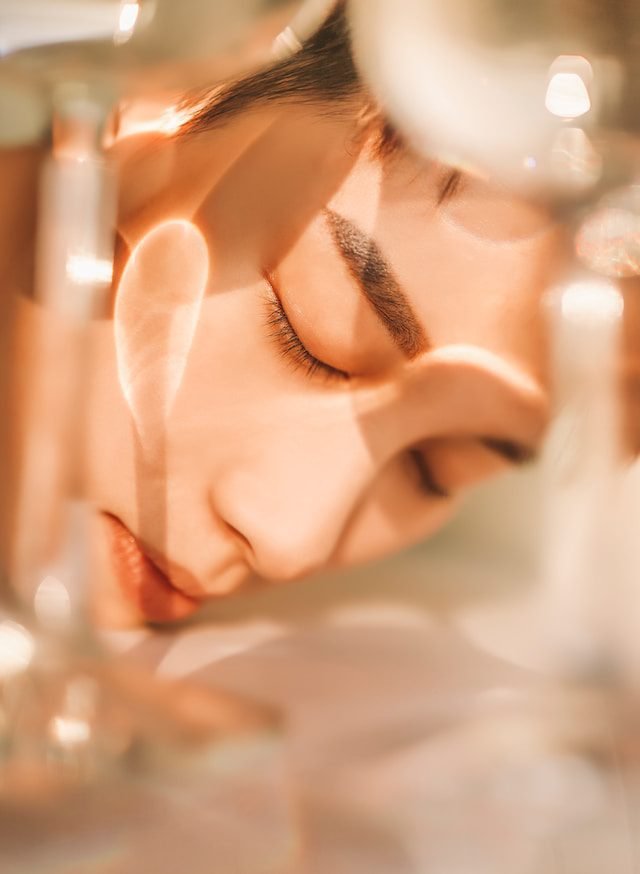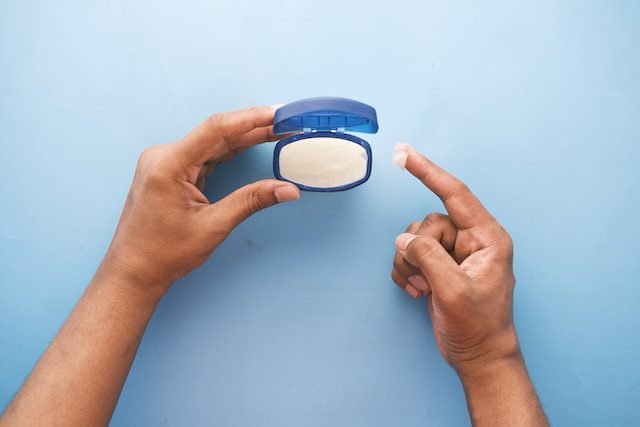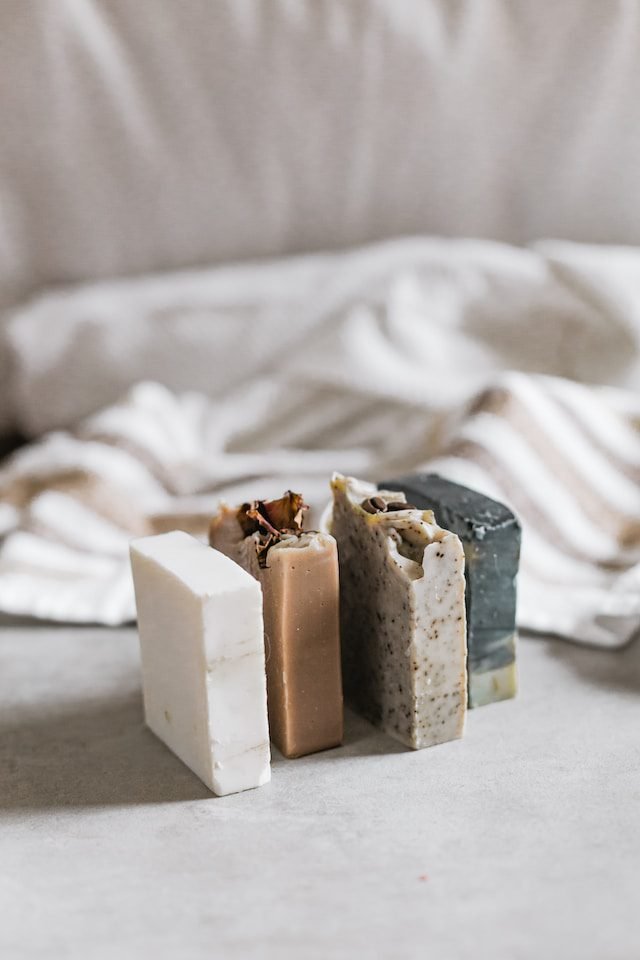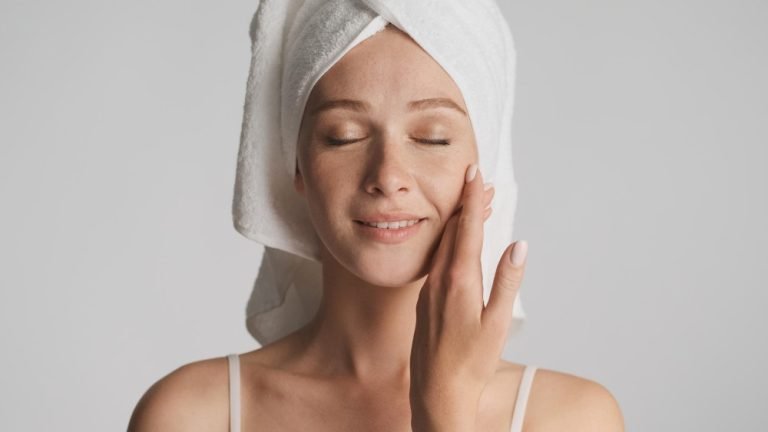Yes, tretinoin can contribute to achieving glass skin. However, it’s important to note that the results may vary depending on individual factors such as skin type, condition, and the specific tretinoin formulation used.
The pursuit of flawless, radiant skin has always been a coveted goal in the beauty industry. One of the latest trends to captivate skincare enthusiasts around the world is the concept of “glass skin.”
With its promise of an ultra-smooth, dewy complexion reminiscent of a perfectly polished glass surface, it’s no wonder that people are eager to explore the means to achieve this coveted aesthetic.
Enter tretinoin, a skincare ingredient that has gained significant attention and acclaim for its transformative effects on the skin. Tretinoin, a derivative of vitamin A, has long been known for its efficacy in treating acne and reducing the signs of aging. However, amidst the buzz surrounding this potent compound, a question arises: Can tretinoin truly give you glass skin?
In this blog, we embark on a journey to uncover the truth behind the claims surrounding tretinoin and its ability to deliver glass skin. We will delve into the fundamental characteristics of glass skin and examine the mechanisms through which tretinoin works on the skin.
What Is Tretinoin?
Tretinoin, also known as all-trans retinoic acid, is a powerful topical treatment derived from vitamin A. It belongs to a class of compounds called retinoids, which have been extensively studied and used in dermatology for their remarkable effects on the skin.
Tretinoin is available in various formulations, including creams, gels, and lotions, and is commonly prescribed by dermatologists for a range of skin concerns.
How Does Tretinoin Work?
Tretinoin exerts its effects on the skin through its interaction with retinoic acid receptors (RARs) located in the cells. When applied topically, it penetrates the skin and binds to these receptors, modulating gene expression and cellular processes. The primary mechanism of tretinoin involves increasing cell turnover, stimulating collagen production, and promoting exfoliation.
Benefits of Tretinoin for the Skin
Tretinoin offers a multitude of benefits that make it a highly sought-after ingredient in skincare. Some of its notable effects include:
1. Acne Treatment
Tretinoin is widely recognized for its effectiveness in combating acne. By unclogging pores, reducing inflammation, and normalizing skin cell turnover, it helps to clear existing breakouts and prevent new ones from forming.
2. Anti-Aging Effects
As we age, our skin naturally changes such as decreased collagen production and slower cell turnover. Tretinoin can counteract these effects by promoting collagen synthesis, improving skin elasticity, and reducing the appearance of fine lines and wrinkles.
3. Hyperpigmentation and Dark Spot Reduction
Tretinoin is effective in addressing hyperpigmentation, including sunspots, melasma, and post-inflammatory hyperpigmentation. It inhibits the production of melanin, the pigment responsible for skin color, resulting in a more even complexion.
Proper Tretinoin Usage and Precautions
It’s important to note that tretinoin is a potent medication that should be used under the guidance of a dermatologist. Here are some essential considerations when using tretinoin:
- Gradual Introduction: Tretinoin can initially cause skin irritation, dryness, and peeling. To minimize these side effects, it is recommended to start with a low concentration and gradually increase frequency and strength over time.
- Sun Protection: Tretinoin can increase the skin’s sensitivity to the sun, making it crucial to use adequate sun protection. Wearing sunscreen with a high SPF and seeking shade during peak sun hours is essential to prevent sunburn and further skin damage.
- Combination with Other Skincare Products: Tretinoin may interact with certain skincare ingredients, such as benzoyl peroxide and exfoliating acids. It is advisable to consult with a dermatologist to ensure compatibility and avoid any potential adverse reactions.
Tretinoin is a powerful skincare ingredient with proven efficacy in treating acne and reducing signs of aging. Its ability to promote skin cell turnover, stimulate collagen production, and address hyperpigmentation has led to speculation about its potential to achieve glass skin.
However, further exploration is required to determine if tretinoin can genuinely deliver the sought-after glass-like complexion. In the following sections, we will examine the characteristics of glass skin and delve deeper into the effects of tretinoin on skin texture, tone, and clarity to unravel the truth behind the hype.
What is Glass Skin?
The concept of glass skin originated in South Korea and quickly gained popularity worldwide. It refers to a complexion that is incredibly smooth, clear, and luminous, resembling the surface of glass. Glass skin is characterized by a poreless appearance, even skin tone, and a radiant, dewy glow. Achieving glass skin is often associated with a meticulous skincare routine and the use of specific products.
Characteristics of Glass Skin
To better understand glass skin, let’s explore its key characteristics:
- Smoothness: Glass skin is known for its velvety texture, devoid of visible pores, roughness, or irregularities. The skin feels exceptionally soft and supple to the touch.
- Clarity: Glass skin is characterized by its exceptional clarity. It has a uniform complexion without visible blemishes, acne scars, or pigmentation irregularities.
- Radiance: Glass skin has a natural, lit-from-within radiance. It reflects light evenly, giving the skin a healthy and luminous appearance.
Steps to Achieve Glass Skin
Achieving glass skin typically involves a multi-step skincare routine and specific practices. While individual approaches may vary, here are some common steps:
- Double Cleansing: Glass skin starts with a clean canvas. Double cleansing, which involves using an oil-based cleanser followed by a water-based cleanser, helps to remove makeup, dirt, and impurities effectively.
- Exfoliation: Regular exfoliation is essential to remove dead skin cells and promote a smoother skin surface. Gentle chemical exfoliants, such as AHAs (alpha hydroxy acids) or BHAs (beta hydroxy acids), can be incorporated into the routine to aid in achieving a refined complexion.
- Hydration: Hydrating the skin is crucial for achieving that coveted dewy glow. Layering lightweight hydrating products like toners, essences, and serums can provide intense moisture and plumpness to the skin.
- Moisturizing: Locking in hydration with a moisturizer is vital for maintaining skin suppleness and preventing moisture loss. Look for moisturizers that are lightweight yet deeply nourishing.
- Sun Protection: Shielding the skin from harmful UV rays is crucial for preserving its health and preventing premature aging. Applying a broad-spectrum sunscreen with a high SPF is a non-negotiable step in any glass skin routine.
Glass Skin Product Recommendations
While specific product recommendations may vary depending on individual skin types and concerns, some common skincare ingredients often associated with glass skin include:
- Hyaluronic Acid: Known for its exceptional hydrating properties, hyaluronic acid helps to attract and retain moisture, giving the skin a plump and dewy appearance.
- Niacinamide: This multi-benefit ingredient helps to improve skin texture, minimize pore size, and enhance overall skin tone and clarity.
- Vitamin C: A potent antioxidant, vitamin C brightens the skin, evens out skin tone, and promotes collagen synthesis for a more radiant complexion.
- Sheet Masks: Sheet masks infused with nourishing serums can provide an instant boost of hydration and impart a radiant glow to the skin.
In the following sections, we will explore the effects of tretinoin on the skin, specifically addressing how it can contribute to achieving the key attributes of glass skin, including skin texture, tone, and clarity. By uncovering the potential benefits and limitations of tretinoin, we can determine if it lives up to the hype in the pursuit of glass skin.
How Tretinoin Improves Skin Texture
When it comes to achieving glass skin, a smooth and refined skin texture is a crucial element. Tretinoin has been widely recognized for its ability to improve skin texture by promoting cell turnover and exfoliation.
1. Cell Turnover and Exfoliation
Tretinoin works by increasing the rate of skin cell turnover. It accelerates the shedding of dead skin cells and promotes the growth of new skin cells, leading to a rejuvenated complexion. This process helps to unclog pores, reduce the appearance of roughness, and improve overall skin texture.
2. Smoothing Rough Skin
One of the primary benefits of tretinoin is its ability to smooth rough skin. It can be particularly effective in addressing conditions like acne, where the skin may become rough and uneven due to the presence of blemishes and post-inflammatory hyperpigmentation. By promoting the shedding of dead skin cells and reducing inflammation, tretinoin helps to refine the skin’s surface and restore smoothness.
3. Addressing Fine Lines and Wrinkles
In addition to improving skin texture, tretinoin is renowned for its anti-aging effects. As we age, our skin naturally develops fine lines and wrinkles due to a decrease in collagen production and the breakdown of elastin fibers. Tretinoin stimulates collagen synthesis, which can help to reduce the appearance of fine lines and wrinkles, resulting in a smoother and more youthful complexion.
4. Potential Side Effects and Considerations
It’s important to note that tretinoin is a potent medication that may cause skin irritation, dryness, and peeling, especially during the initial stages of use. These side effects are often temporary and can be managed by starting with a low concentration of tretinoin and gradually increasing usage as the skin adjusts. Moisturizing regularly and using gentle skincare products can also help minimize these effects.
5. Complementary Skincare Practices
To maximize the benefits of tretinoin in improving skin texture, it is essential to adopt complementary skincare practices. This includes regular exfoliation using gentle chemical or physical exfoliants (such as AHAs or gentle scrubs), as well as incorporating hydrating and nourishing products into the skincare routine to maintain skin moisture and support the skin’s barrier function.
While tretinoin can contribute significantly to improving skin texture and smoothness, it’s important to have realistic expectations. The extent of improvement may vary depending on individual factors, such as skin type, condition, and the specific tretinoin formulation used.
Consulting with a dermatologist can provide personalized guidance on the appropriate usage and concentration of tretinoin for optimal results.
In the next section, we will explore how tretinoin can impact skin tone and address concerns related to hyperpigmentation, ultimately contributing to the attainment of glass skin.
How Tretinoin Improves Skin Tone
Achieving a balanced and even skin tone is a key aspect of glass skin. Tretinoin has demonstrated its potential to address various concerns related to skin tone and pigmentation irregularities, making it a valuable tool in the pursuit of a glass-like complexion.
Hyperpigmentation and Dark Spot Reduction
Hyperpigmentation, including sunspots, melasma, and post-inflammatory hyperpigmentation, can contribute to an uneven skin tone. Tretinoin is effective in reducing hyperpigmentation by inhibiting the production of melanin, the pigment responsible for skin color. By reducing the appearance of dark spots and promoting a more even distribution of melanin, tretinoin can help achieve a clearer and more uniform complexion.
Skin Brightening and Radiance
Tretinoin’s ability to increase cell turnover and stimulate collagen production can contribute to skin brightening and radiance. As the skin undergoes the process of exfoliation and renewal, the accumulation of dead skin cells and dullness is minimized, allowing the fresh and healthy skin underneath to shine through. The result is a more radiant and luminous complexion that aligns with the glass skin aesthetic.
Acne and Blemish Control
Acne breakouts can often lead to blemishes and post-inflammatory hyperpigmentation, further contributing to an uneven skin tone. Tretinoin’s effectiveness in treating acne can help prevent and minimize blemishes, reducing the occurrence of new pigmentation irregularities. By targeting the root causes of acne and promoting faster healing, tretinoin can contribute to a more balanced and clear skin tone.
Combining Tretinoin with Other Ingredients
To enhance the effects of tretinoin on skin tone, it can be beneficial to incorporate other skincare ingredients that complement its actions.
For example, combining tretinoin with vitamin C can provide synergistic effects in reducing hyperpigmentation and promoting skin brightening. Niacinamide, known for its skin tone-balancing properties, can also be a valuable addition to a tretinoin-based skincare routine.
In the following section, we will explore how tretinoin can impact skin clarity and address concerns related to acne, blemishes, and overall skin clarity, further contributing to the attainment of glass skin.
How Tretinoin Clears The Skin
To achieve glass skin, a clear and blemish-free complexion is essential. Tretinoin has been widely recognized for its effectiveness in improving skin clarity by targeting acne, reducing blemishes, and promoting overall skin health.
Acne Treatment and Prevention
Tretinoin is renowned for its efficacy in treating acne. It works by reducing the formation of comedones (clogged pores), decreasing inflammation, and promoting the shedding of dead skin cells. By addressing the underlying causes of acne, tretinoin can help clear existing breakouts and prevent new ones from forming, leading to improved skin clarity.
Reduction of Blemishes and Scarring
Tretinoin can play a significant role in reducing the appearance of blemishes and post-inflammatory hyperpigmentation caused by acne or other skin irritations. It aids in the exfoliation of damaged skin cells and stimulates collagen production, helping to fade blemishes and scars over time. With consistent use, tretinoin can contribute to a clearer complexion with diminished blemishes.
Skin Renewal and Clarity
By promoting skin cell turnover and renewal, tretinoin helps to reveal fresh and healthy skin cells. This process helps to improve skin clarity by minimizing the appearance of dullness, roughness, and uneven texture. With continued use, tretinoin can contribute to a more refined and radiant complexion.
Supporting Overall Skin Health
Tretinoin not only addresses specific skin concerns but also supports overall skin health. It helps to normalize oil production, unclogs pores, and maintain the integrity of the skin barrier. By optimizing these fundamental aspects, tretinoin can contribute to a healthier skin environment, which in turn enhances skin clarity and prevents future blemishes.
Patience and Consistency
It’s important to note that achieving significant improvements in skin clarity with tretinoin may require patience and consistency. Results are typically seen gradually over time, and it may take several weeks or even months to notice significant changes. Adhering to a consistent tretinoin skincare routine and following the dermatologist’s instructions is crucial for optimizing its benefits and achieving the desired glass skin clarity.
It’s important to remember that individual results may vary, and tretinoin may not be suitable for everyone. Consulting with a dermatologist is essential to determine the appropriateness of tretinoin treatment for your specific skin concerns and to receive personalized recommendations.
In the next section, we will address the limitations and potential considerations when using tretinoin in the pursuit of glass skin.
Potential Side Effects
While tretinoin can have significant benefits for the skin and contribute to achieving a glass skin-like complexion, it’s important to be aware of its limitations and consider certain factors when incorporating it into your skincare routine.
Tretinoin can cause side effects, especially during the initial stages of use. These may include skin dryness, peeling, redness, and increased sensitivity to the sun. It’s important to start with a low concentration of tretinoin and gradually increase usage as tolerated to minimize these side effects. Moisturizing regularly and using gentle skincare products can also help alleviate any discomfort.
Skin Sensitivity
Individuals with sensitive skin may experience more pronounced side effects when using tretinoin. It’s essential to monitor your skin’s response and consult with a dermatologist if you have concerns about skin sensitivity or if you experience persistent irritation or discomfort.
Sun Sensitivity and Sun Protection
Tretinoin can increase the skin’s sensitivity to the sun, making it crucial to use adequate sun protection. Sun exposure without proper protection can lead to sunburn, skin damage, and the worsening of hyperpigmentation. Incorporate a broad-spectrum sunscreen with a high SPF into your daily skincare routine and limit sun exposure, especially during peak hours.
Gradual Introduction and Patience
Tretinoin is a potent medication, and the results may take time to become noticeable. It’s important to introduce tretinoin gradually into your skincare routine and have realistic expectations. Significant improvements in skin texture, tone, and clarity may require several weeks or even months of consistent use.
Personalized Guidance
Every individual’s skin is unique, and the use of tretinoin should be tailored to their specific needs. Consulting with a dermatologist is essential to determine the appropriate concentration, usage frequency, and complementary skincare practices that suit your skin type and concerns. A dermatologist can provide personalized guidance and monitor your progress to ensure optimal results.
Conclusion
The pursuit of glass skin, characterized by a smooth, clear, and radiant complexion, has gained popularity in recent years. Tretinoin, a powerful topical medication, has emerged as a promising tool in achieving glass skin-like results.
Tretinoin has demonstrated its potential to improve skin texture by promoting cell turnover and exfoliation, leading to a smoother and more refined complexion. It can address concerns such as roughness, acne, and fine lines, contributing to the overall velvety feel associated with glass skin.
Remember, glass skin is not solely dependent on tretinoin but also encompasses a holistic skincare approach. Incorporating other beneficial ingredients, maintaining a healthy lifestyle, and practicing good skincare habits are essential in achieving and maintaining a glass skin-like complexion.
So, if you’re seeking that coveted glass skin, consider the potential benefits of tretinoin, consult with a dermatologist, and embark on a skincare journey that combines effective ingredients, tailored routines, and a commitment to skin health. With the right approach, you can take significant strides toward attaining your desired glass skin aesthetic.





